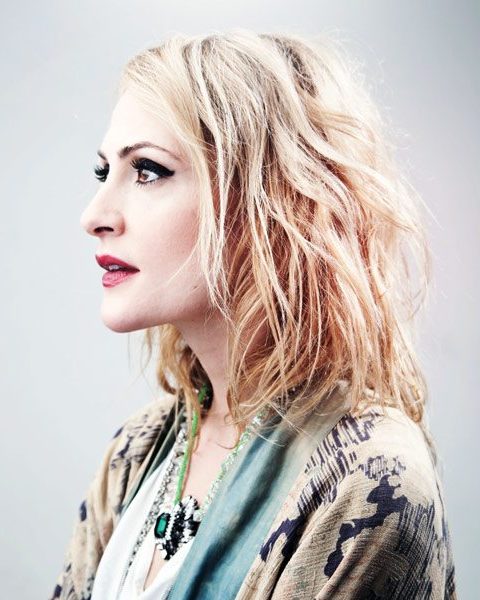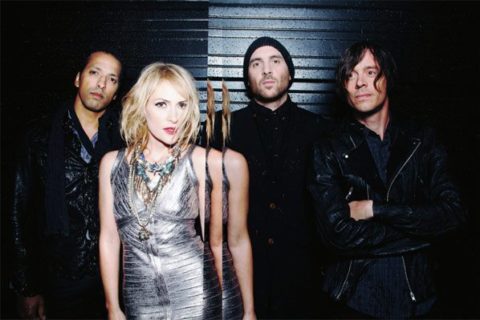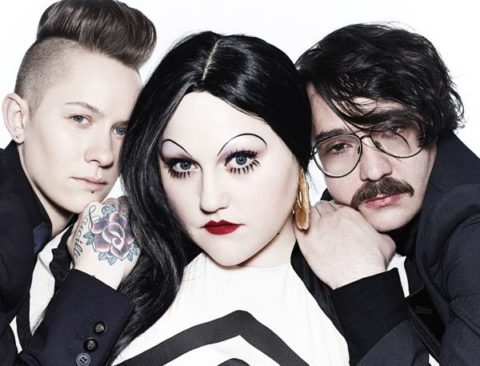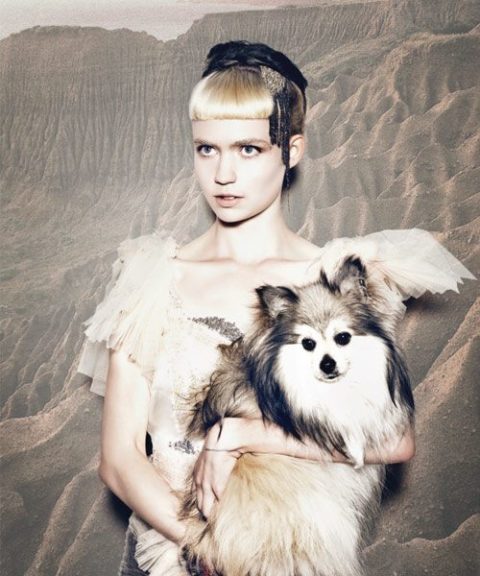Summer music guide: Our hot list features Metric, Grimes and more


Because summer is the ultimate time for tunage, we’ve picked out a few of our favourite ladies to listen to while you’re busy sitting on the dock of the bay.
METRIC | GOSSIP | GRIMES | EMELI SANDÉ | MELANIE FIONA

REALITY CHECK
By Mary Dickie
Metric’s latest album takes pop on a trip. Singer Emily Haines assures Mary Dickie this is no fantasy.
The word “synthetica” might evoke images of Lucite bangles by Alexis Bittar or acrylic-embellished Christian Louboutin heels, but Metric had something much loftier in mind when they made it the title of their latest album. They chose a name that addressed the “real vs. fake” debate permeating today’s Auto-Tuned, silicone-enhanced pop culture. It also represents a step forward sonically for the Toronto new wave /indie rock band, with a more futuristic, even cinematic sound.
Synthetica began with Metric singer and keyboardist Emily Haines writing about a “nightmare robot” character inspired by a replicant from the cult sci-fi movie Blade Runner. At the same time, guitarist Jimmy Shaw was becoming obsessed with the sounds he was getting from vintage synthesizers. Eventually, they realized that those synths were a potent symbol of the intriguing grey area between human and machine.
“At the time of their invention, synthesizers were the sound of the future,” says Haines. “When we imagine the sound of an alien spaceship landing, it’s not a guitar riff, right? It’s some tweaked-out synth. But we found that those instruments actually seemed the most human of all—they’re just pulses of energy. So a lot of our preconceptions got turned on their heads.”
As they worked on the songs with bassist Josh Winstead and drummer Joules Scott Key, Haines and Shaw let the theme lead them. “We’d be writing and we’d stop and say, ‘Where’s this going?’” she says. “It was like asking the oracle what the hell we were talking about, and it just became clearer: the idea of what’s artificial and what’s not in an age when so many things are manufactured.”
Haines stresses that Synthetica is not a concept album, and when Metric plays live, don’t expect her to dress as a replicant—or a conventional pop star. “Seeing women on stage in their underwear amazes me,” she says. “I mean, they look great, but that’s not going to happen with me anytime soon.” Haines admits her stage style has evolved over the years, though, from scruffy T-shirts to a more glam look that includes sequined tanks and sparkly mini-dresses. “I had a uniform in the days when we played clubs,” she says. “There was no point in having much more. You’d throw your bag in the back of the van, and what are you going to bring—a wardrobe? So for two years I wore a black skirt with pinstripes, wedge boots given to me by Agnès B and a top I got at a thrift store, with a neck that stood up. I was honing my frenetic dancing style and I always felt really comfortable in that top. Then I lost it, which was momentous.”
Recognizing the importance of presenting a sharper image during live shows, Haines began to put more effort into her look. “I had friends make me a few things and then I started to get the idea of coming up with clothes for the stage,” she says. “It was homemade at first, certainly not high fashion. The most important thing was to be free in my movements. You’d be amazed what I have to do to perform—it’s like preparing to be launched into space. Nothing can be hanging, dangling or catching, nothing I can trip over, nothing that’s going to move—things have to be really set.”
METRIC | GOSSIP | GRIMES | EMELI SANDÉ | MELANIE FIONA

Now, creating performance wear is something Haines enjoys. “We look at pieces from designers like Balmain and adapt them into versions that work for the stage,” she says. “The best clothes are the ones you forget you’re wearing. I’m excited to get back into that side of performance. I feel like I owe it to the audience to put on a great rock ’n’ roll show that looks fantastic.”
Although she says the original Synthetica character was almost like a fake version of herself as performer, Haines is not the kind of singer who protects her privacy with an onstage persona. “It’s challenging every time to get the confidence to stand up there,” she says. “But 10 years of crafting the skills of playing in a band with my friends is the armour. The four of us have created it together and that’s all the protection I need.”
Both Haines and Shaw stress how important the band’s closeness has been to its longevity. “Once you have a respect for each other’s ideas, everybody can weigh in and get used to being told their idea sucks, and it’s not a big deal,” says Haines.
“I think the band is closer than ever,” adds Shaw. “Especially between me and Emily. There’s so much history. We communicate in a way that I’ve never experienced with anybody else. We don’t even need words—except for the fact that we argue all the time. It’s part of the process and it doesn’t freak us out.”
Despite the fact that Haines warns us against meeting our heroes in the song “Breathing Underwater,” Synthetica features a guest vocal from one of hers, Lou Reed. “The first thing he said when we met was, ‘Who would you rather be, the Beatles or the Rolling Stones?’” she says. (He was quoting Metric’s hit, “Gimme Sympathy.”) “I replied: ‘The Velvet Underground.’ It was amazing that he knew my work.” Reed invited Haines to participate in a festival he and his wife, Laurie Anderson, were curating in Australia, and when Metric were struggling with the vocals on “The Wanderlust,” Haines called him. “We stood in the studio looking at each other and singing, which was super intense and weird and amazing and fun,” she says.
As they prepare to tour Synthetica, Haines and Shaw feel proud that Metric’s successes—making hit records, selling out arenas, co-writing the theme for Twilight: Eclipse and the score for the new David Cronenberg movie Cosmopolis—have come on their own terms. They now release their music worldwide on their own label, forming partnerships to take advantage of new opportunities. Shaw points out that this creates closer ties with their fans, but it also helps them resist being forced into a pop-star mould—which might be what Synthetica is ultimately all about.
METRIC | GOSSIP | GRIMES | EMELI SANDÉ | MELANIE FIONA

GOSSIP
By Elio Iannaacci
Fashion is always on the lookout for a good woman with strong pipes. Case in point: Beth Ditto’s audacious dance track, “I Wrote The Book,” has dominated designer playlists for more than two seasons. Though released last year on her self-titled solo EP, “I Wrote The Book” has gained more club, radio and runway traction with time. Sounding closer to a ’90s house music hit than the punk-pop Ditto typically records with her band, Gossip, the cut is on its way to becoming a classic.
“I’ve always wanted to perform an epic song that both drag queens and designers could use in their shows,” Ditto says via telephone from New York. “Fashion is about trends, but style is a different thing—it comes from the soul.” Having done a jaunt on Jean Paul Gaultier’s Spring 2011 catwalk, a clothing line with U.K. retailer Evans and a makeup collaboration with M.A.C, Ditto’s connection to style extends past the front row. “I think the real fashion world is filled with eccentric weirdos—passionate, crazy freaks that are cut from the same cloth.”
“This year is all about getting back to my baby, though,” the Arkansas native says of her latest album with Gossip, an 11-track affair called Joyful Noise. “[We’ve] grown so much and it shows in our music.” She adds that the band’s new songs—crafted with drummer Hannah Blilie and guitarist Nathan Howdeshell—were written as she was waving goodbye to her 20s.
“Life sounds like a completely different version once you turn 30,” says Ditto, who celebrated her 31st birthday in February. “I wanted to capture that maturity.” As proof, she points to new songs such as “Get Lost” and “Move in the Right Direction.” “It’s a time when you start following what you like and leaving what you don’t like in the dust. Looking cool doesn’t factor in anymore…you start tolerating less bullshit too. You end up embracing so much more of yourself in the process.”
For A Joyful Noise, Ditto felt influenced by some of the groove and syncopation fuelling her solo EP. “I love crossing over different types of music and I think punk, disco and house music are genres that were born to make statements. Some people don’t think dance music can be as radical as punk but I do.”
Leave it to Ditto, a self-proclaimed and proud “lesbian-feminist,” to feel at ease shaking up the status quo. “For me, that’s what being who I am is all about,” she says. “My manager always says to me, ‘Your body is such a crazy source of debate, and I’m like, ‘Good.’ I feel [it] should be talked about and it should be brought up. I am all for starting a conversation or debate. Punk has always been about carrying the political weight.”
METRIC | GOSSIP | GRIMES | EMELI SANDÉ | MELANIE FIONA

GRIMES
By Elio Iannaacci
Claire Boucher lives life without a cellphone. She only surfs the net when she absolutely needs to and although she tweets irreverent things such as, “when i grow up i want 2 b Patricia Arquette in True Romance,” the Vancouver-born singer-songwriter is neither iPad nor app addicted. Despite that, the 24-year-old has been hailed “the future” of pop by critics and bloggers alike. However, ask about her fawning fanbase—and the countless Tumblr, Blogger and Pinterest accounts she populates—and you’ll get next to nada. “I’m totally out of the loop,” she says en route from her current home base in Montreal to New York for a gig. “I don’t have the internet…and right now I’m in a tour van using somebody else’s line.”
Known to most simply as Grimes, Boucher may not be as hyper-connected as the average Jane but on her latest album, Visions, she knows exactly when to summon her tech-savvy powers. The third in a line of electronic, experimental affairs, Visions has grabbed the attention of Pitchfork (“a statement that feels focused, cohesive, and assured”), NME (“drips with instinct, an eerie sixth sense”) and The New York Times (“one of the most impressive albums of the year”).
The album takes a cerebral approach to sound, and part of Boucher’s M.O. is actually raising the bar on pop music as a genre. “Pop music is often seen as a low-brow category,” she says, “At its core, pop is about being immediately gratifying on a super-sensual level. It’s what feels best, what hits the musical G spot. But I think it can be really emotionally pleasant and experimental. It is just an underlying concept, then you can do anything.”
Visions, especially the stunning, synth-layered songs such as “Vowels = Space and Time” and “Genesis,” is partially driven by Boucher’s image-obsessed persona.
“Artists who have a strong visual component to their music tend to do well—that’s one of the realities of pop music,” says Boucher, whose videos “Oblivion” and “Vanessa” have been shared across a wide spectrum of art, fashion and music blogs.
“If you look at Lady Gaga, Beyoncé or Michael Jackson, they all have an extremely specific and strong aesthetic, and that’s something I want to bring into indie music,” she says. Her own look tips its hat to the ’90s film/comic book Tank Girl, as well as chic aliens. “I feel [images are] so imperative to developing the idea of an icon and that’s something I really care about. Music, too, is just iconography.”
Grimes enlists designers such as Montreal’s Renata Morales—who also frequently dresses Arcade Fire’s Regine Chassagne—to help her shape a visual identity. Her dream collaborator would be Kansas-born fashion designer Jeremy Scott. “I love him,” she says, unabashedly gushing. “He makes the high fashion manifestation of pieces I would wear in real life. I believe fashion takes the idea of what’s beautiful about the human form and fully realizes it.”
Grimes’ next steps are a soon-to-be-scheduled tour followed by more time in the studio, as well as more of her visions. “I have so much further to go and so much that I want to get done,” Boucher says. “Pop isn’t limiting to me. I feel that there’s so much room in that to explore.”
METRIC | GOSSIP | GRIMES | EMELI SANDÉ | MELANIE FIONA

EMELI SANDÉ
By Elio Iannaacci
Emeli Sandé gets a little emotional when a certain British hitmaker is mentioned in conversation. “When you say, ‘Adele,’ I say, ‘Hope,’’’ the Scottish-born singer-songwriter says. “People want to hear themselves in music again. Music with all the flaws and breaks. Her honesty has taken over the world.” A fairly unknown name in Canada, Sandé (who changed her first name—Adele—to Emeli) seems to be on the same path her idol has taken. She’s already climbed the British charts with two singles off her debut disc, Our Version of Events (“Heaven” and “Next To Me”), become Simon Cowell’s current favourite crooner and won one of the most coveted Brit Awards—the Critics’ Choice trophy. Yet Sandé’s beginnings couldn’t be more different than those of most pop artists. She started getting serious about songwriting in between patient visits while in medical school. “I was working and studying in the neurological ward, and there was this lady who was a paraplegic,” she recalls. “Her son was visiting and she told me her whole tragic story and let all these emotions come out. Part of that intense connection ended up becoming the song ‘My Kind of Love.’”
Sandé is planning on performing the track while opening for Coldplay in July during the band’s tour dates in Montreal and Toronto. And she already has a few ideas fired up for new material.
“I really want to write about the speed of everything at the moment,” she says. “Everything’s changing and the way we communicate is so rapid. I just want to do my part to slow it down.”
METRIC | GOSSIP | GRIMES | EMELI SANDÉ | MELANIE FIONA
MELANIE FIONA
By Elio Iannaacci
When it comes to boy pop, indie rock, folk and French-Canadian chanteusery, Canada’s music scene is pretty much taken care of. Female-fronted soul music? Not so much. In the past 20 years, our fair and native land has seen less than a dozen women soar beyond the 49th parallel in the R&B category. Jully Black, Deborah Cox and Tamia made major strides but the only Canadian woman to win a Grammy in an R&B category is Melanie Fiona, who captured two trophies this year for “Fool For You,” a duet with CeeLo Green. Fiona says her success couldn’t have come at a better time.
“Adele turned it around at the Grammys. I’m in a good place,” she says from her home in Toronto while promoting her sophomore disc, The MF Life. “Real voices are being asked to step up to the front of the line.” Fiona’s new songs mix electro, pop and acoustic rock the same way soul heroes such as En Vogue, SWV and Adele have. “I couldn’t be more thrilled that the genre has reopened,” Fiona says. “[We] offer an antidote to all the one-dimensional drama taking over the culture.”
Fiona sees herself as “the complete antithesis” of reality TV. “There’s more out there than just train wrecks when it comes to women in love. None of these shows give people the creative side to heartbreak.”
She’s written for Rihanna, collaborated with Drake and opened for Kanye West, and Fiona plans to keep connecting with musical power players for Canada’s sake. “Drake is putting us on the map for rap, and I want to put us on the map for R&B.”







